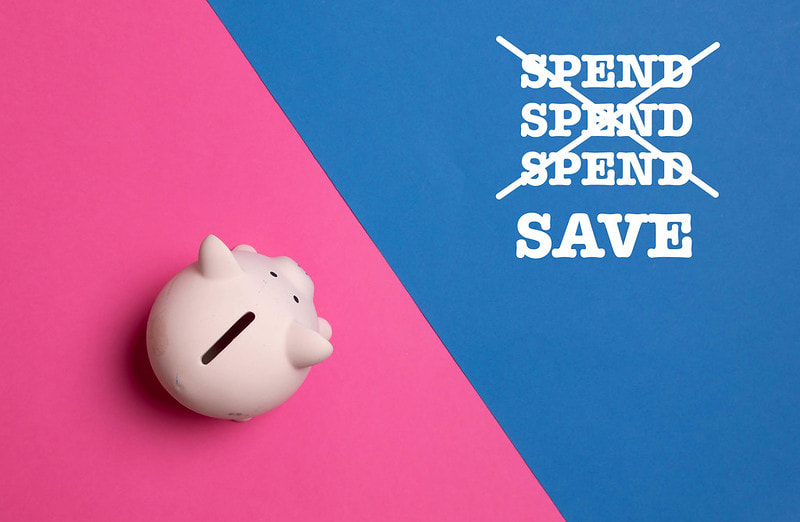|
When my wife and I were newlyweds I was making minimum wage ($4.35/hr) working at a warehouse in Southern California.
With a new baby on the way, I had to figure out a better way to make ends meet. My boss set me up with a meeting with a man who used a financial plan created by Larry Burkett (the guy Dave Ramsey studied under) and he showed me how to create and monitor a monthly budget. The bottom line was that income must exceed expenses otherwise I would be in debt, which was bad news. When your average gross income is $754 a month you have to get very creative in order to make ends meet. Once I graduated from college I was sure I’d be able to get a good job, eventually, but that was still over 6 months away and while I had overtime and odd jobs to supplement my base wage, we needed a system to control expenses. These are the questions that my wife and I committed to ask before every expense. It was transformational! The same concepts can be applied to small businesses as well as non-profits.
These questions can be applied to any purchase. A vehicle, rental space, household or general business expense. For fun let's just say we found a pair of hiking boots on sale for $85. I'll walk through the questions and lets see what happens. 1. Do we need it? Since my primary job is indoors and I work inside I would have to say no. Now let's say I was planning on hiking the Pacific Crest Trail. In that case the answer would be yes assuming the PCT got past the questions and still survived. 2. Do we need it now? If my PCT journey begins in May next year and it is December the answer is no. We don't have to spend the money now. 3. What are the options? Is there another way? Well, perhaps we could use hiking shoes or synthetic material vs leather. It is possible to hike in tennis shoes but not advisable. There are lots of styles, makes and models of hiking boot. Are there sales? What about the bargain barn at Sierra Trading Post? 4. Can we get it used? Yes, In our town we have lots of outdoor people so the thrift shops are full of cool outdoor gear including boots. What about the REI garage sale? Craigs list? If we are patient and know exactly what we need, there is a good chance we can find it used. Another idea is to post on some outdoor forums and ask if anyone has your size boot that they would like to get rid of. 5. Can we get it for free? Yes, it is possible to write the boot manufacturer and ask if they would sponsor the event. We could pick a cause and raise support for a nonprofit and perhaps we will receive a free pair of boots to help us accomplish our mission. Who do we know that is an outdoor fashion king? If our size matches we should be able to get the hand me downs when they upgrade next month. 6. Is it budgeted? If the answer is no then don't spend the money. If the answer is yes then you still need to check the bank account and make sure you have enough cash to cover the expense. You can only spend budgeted dollars after the budgeted income has been deposited. Now if you have a surplus in one account and you forgot about an expense in another then it may be acceptable to borrow or transfer from the surplus account. However, do not get into the habit of robbing Peter to pay Paul otherwise why bother having a budget to begin with. 7. Can we afford it? If the answer is no then again you should not spend the money. However, just because you have money in your account does not mean you should buy the item. You can burn through a lot of cash if you get careless about spending just because you can. In the case of the boots let's say that we are on track for purchasing them in January. So in this scenario we will wait and see if we can find a good pair of boots another way for the next couple of months. If not we can always buy them at full price later. Conclusion: My wife and I saved thousands per year using creative approaches to getting what we needed. Once I started making more money we relaxed and thought we could "afford it." We started paying retail prices and although we saved a bit of time, we scratched our head at the end of each month wondering why our bank account was so low when our income was so much higher. When we went back to the 7 questions we saw major results in as little as two months. Here's your challenge! Write down the 7 questions on the back of a business card and put it in your wallet. Every time you are about to buy something, go through the questions, and see how it impacts your cash on hand. Try it for 3 months. It may be hard at first but I think you will like the results.
1 Comment
Steve
10/5/2019 07:53:40 am
Your rules remind me of the three rules for controlling expenses we taught our kids.
Reply
Leave a Reply. |
AuthorDwight Grant is a seasoned businessman with over 30 years of leadership experience. He lives in CO where he enjoys whitewater rafting, mountain biking and spending time with family. Archives
May 2022
Categories
All
|
ServicesIncrease Profit
Team Dev. (6 types of working genius) Work/Life Objectives Consulcoaching WEBINARS 6 Keys to Business Success Plan Best Year Yet 5 Golden Nuggets of Fundraising 5 Nuggets Handout |
Company |
|


 RSS Feed
RSS Feed